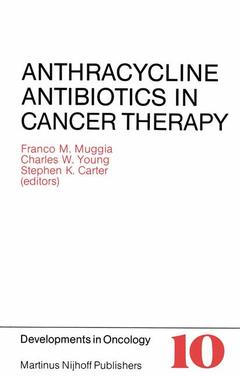Anthracycline Antibiotics in Cancer Therapy, Softcover reprint of the original 1st ed. 1982 Proceedings of the International Symposium on Anthracycline Antibiotics in Cancer Therapy, New York, New York, 16-18 September 1981 Coll. Developments in Oncology, Vol. 10
Langue : Français
Coordonnateurs : Muggia Franco M., Young Charles W., Carter Stephen K.

F. M. MUGGIA When faced with the inadequacies of current cancer treatment, we prefer to look at what the future may hold. Quite often, we take for granted the past, preferring research into totally new areas. However, the persistent development of fertile soil may yield surprising rewards for those who choose to build on the knowledge of the past--hence, this symposium on anthracycline antibiotics. Although the anthracycline antibiotics represent much of the present and future of cancer treatment, their actual use c stretches back barely two decades to the pioneering efforts of Aurelio Di Marco, who characterized the antitumor properties of daunomycin and adriamycin. * The clinical application of these two compounds heralded a decade of excitement among oncologists dealing with pediatric tumors, breast cancer, leukemias, and lymphomas, and opened new hope for patients afflicted with sar comas and a variety of other tumors that had been deemed - sistant to chemotherapy. These successes were tempered with the realization that the antitumor effect of anthracyclines could be achieved at times only at the very high price of risking cardiac decompensation and, almost invariably, with the occurrence of alopecia and other acute toxicities. This record of past achievements and problems has slowly given way to a present increasingly illuminated by our ability to modify the distressing toxicities of these agents. Detailed clinical studies supplemented by ingenious laboratory models have gradually elucidated mechanisms and risk factors im plicated in the cardiomyopathy.
Section 1. Biolgical Effects.- Antitumor Activity of Anthracyclines: Experimental Studies.- Anthracycline Antitumor Antibiotics: Their Carcinogenicity and their Mutagenicity.- The Immunological Activity of Anthracyclines.- Section 2. Mechanism of Action.- Doxorubicin and Related Compounds. I. Physiochemical Characterization of the DNA Complex.- Consequences of DNA Intercalation: Protein-Associated DNA Strand Breaks.- Free Radical Damage.- Intracellular, Intranuclear, and Subchromosomal Localization of Anthracycline Antibiotics.- Effects of Anthracyclines on Macromolecules and their Syntheses.- Biotransformations of Anthracyclines in the Smooth Endoplasmic Reticulum of Rat Liver.- Transport and Storage of Anthracyclines in Experimental Systems and Human Leukemia.- Calcium Flux and Metabolism in the Pigeon Heart Following Doxorubicin Treatment: A Study of Acute Changes.- The Role of Acute Lipid Peroxidation in Doxorubicin Cardiotoxicity.- The Physicochemical Properties and Transmembraneous Transport of Doxorubicin.- Section 3. Drug Development.- Doxorubicin and Related Compounds. II. Structure-Activity Considerations.- Second-Generation Anthracyclines.- Factors in Selection of New Anthracyclines.- Implications of Free Radical Activation for Improved Anthracycline Therapy.- Screening for Second Generation Anthracyclines in a Human Tumor Cloning System.- Activity of Anthracyclines on Human Tumors in Vitro.- Pharmacologic and Therapeutic Characteristics of Anthracycline Liposome Preparation.- N-L-Leucyl Derivatives of Anthracyclines: Toxic and Chemotherapeutic Properties.- Alternative Methods of Drug Delivery.- Section 4. Cardiotoxicity.- The Role of Free Radical Damage in the Genesis of Doxorubicin Cardiac Toxicity.- Screening for Cardiotoxic Properties.- Role of Oxygen Radical Formation in Anthracycline Cardiac Toxicity.- Morphologic Assessment of Cardiac Lesions Caused by Anthracyclines.- Cardiac Monitoring of Patients Receiving Anthracyclines.- Reduction of Adriamycin Cardiac Toxicity by Schedule Manipulation.- Rationale and Design of a Trial to Evaluate the Cardiotoxicity of Weekly Schedules of Adriamycin, with Endomyocardial Biopsy Used as an End Point.- Anthracyclines in Cancer Chemotherapy.- Section 5. Doxorubicin: New Clinical Investigations.- Doxorubicin in the 1980s: Is there still Room for Clinical Investigation?.- A Phase I/II Study of 6-Hour and 24-Hour Intravenous Infusions of Doxorubicin.- Intravesical Chemotherapy in the Treatment and Prophylaxis of Bladder Tumors, with Special Reference to Doxorubicin.- Intraperitoneal Adriamycin in Ovarian Cancer.- Role of Adriamycin in Breast Cancer and Sarcomas.- Prospects for Doxorubicin in Adjuvant Breast Cancer Trials.- Clinical Evaluation of 4?-Epi Doxorubicin and 4-Demethoxy Daunorubicin.- Section 6. Clinical Studies with new Anthracyclines and Related Compounds.- The Anthracyclines--A Historical Perspective.- Phase-I Trial with 4-Demethoxydaunorubicin.- Clinical Studies of New Anthracycline Analogs.- A Clinical Overview of Aclacinomycin A in Japan.- The Clinical Pharmacology of Aclacinomycin-A.- Phase II Evaluation of N-Trifluoroacetyladriamycin-14-Valerate (AD 32).- Preliminary Experience with Marcellomycin: Preclinical and Clinical Aspects.- Preliminary Phase II Experience with 4?Epidoxorubicin.
Date de parution : 03-2012
Ouvrage de 568 p.
15.5x23.5 cm
Disponible chez l'éditeur (délai d'approvisionnement : 15 jours).
Prix indicatif 52,74 €
Ajouter au panierThème d’Anthracycline Antibiotics in Cancer Therapy :
Mots-clés :
DNA; antibiotics; biopsy; leukemia; liver; mutagen; ovarian cancer; pharmacology; screening; tumor
© 2024 LAVOISIER S.A.S.



